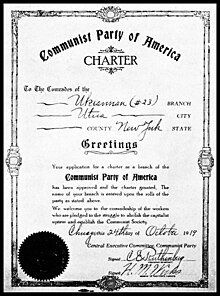Tom Maidhc O'Flaherty
East beach of Inishmore, O'Flaherty's birthplace
O’Flatherty's education was subsidized by Roger Casement, the British diplomat who exposed slavery in the rubber collection zones of the Belgian Congo and the Putomayo an area in between Peru and Colombia and was later executed in 1916 for his part in the 1916 Rising.
Career
Charter for local unit of the Communist Party of the USA (October 24, 1919)
He was among those who first joined the American Communist Party, where he was an associate of John Reed, James P. Cannon, and William F. Dunne. He was a columnist for the Daily Worker and was the first editor of the Labour Defender.
O'Flaherty was active in the defence of imprisoned Irish labour leader James Larkin and was editor of the left-wing Irish-American paper The Irish People.
He left the Communist Party and returned to Ireland in 1934 because of ill-health. There he became editor of the Irish-language left-wing paper An tÉireannach.
Personal life and death
O'Flaherty's brother Liam (1896–1984) was an Irish novelist and short story writer who played an important role in the Irish literary renaissance as well as helping to found the Communist Party of Ireland.His sister Bríd's Ní Fhlatharta son was Gaelic Athletic Association commentator and writer, Breandán Ó hEithir.[2]
His health problems may have been exacerbated by heavy drinking.
Tom Maidhc O'Flaherty died of heart failure on the Aran islands in December 1936.
Works
Like his brother Liam, O'Flaherty retained a deep interest in the Irish language. Unlike Liam, however, he wrote fiction only in English. His works include two books of short stories:- Aranmen All
- Cliffmen of the West
Legacy
O’Flaherty figures in the memoir of Whittaker Chambers, who worked with him at the Daily Worker in New York City:Behind Comrade Angelica sat Comrade Tom O'Flaherty. He was a big, unhappy Irishman, who lived sadly in the shadow of his celebrated brother, Liam, the author of The Informer and The Assassin. He drank heavily, and I have sometimes seen him lying, stiff and foul, in front of the Workers Center on Union Square. He was bad publicity. So he would be roughly lugged inside, amidst taunts and remarks of disgust, by men who were not worthy to touch him. For Tom O'Flaherty was a man of some gifts and a brisk sense of humor (always a heavy cross for a Communist). Secretly, he hated the bad journalism, the low gossip, base intrigues, the foolish and fetid factionalism around him. Secretly, and sometimes openly, he would gibe at them. The American party was aping the Russian style of abbreviating organizational names (the world had not yet been conditioned to alphabet soup). I once heard O'Flaherty solemnly propose to the humorless Engdahl that henceforth the Daily Worker should refer to the United Councils of Working Class Housewives as the Uncopwokwifs.
One day Tom O'Flaherty did not show up at the Daily Worker office. The revolution of the 20th century was over for him. He was dead, a pathetic exile from his country, his church and his world.
Next to Comrade O'Flaherty sat Comrade Chambers...[3]
See also
References
- Chambers, Whittaker (May 1952). Witness. New York: Random House. pp. 222–223).
External sources
- Ó hEithir, Breandán (1991). 'Liam Ó Flaithearta agus a Dhúchas' in An Chaint sa tSráidbhaile. Comhar Teoranta.
- O'Flatherty, Tom (1991 - reprint). Aranmen All. Brandon Book Publishers.
- Tim Robinson (cartographer) (1995). Stones of Aran: Labyrinth. Lilliput Press.
- http://www.compulink.co.uk/~jplant/revhist/otherdox/monaghan.htm


No hay comentarios:
Publicar un comentario